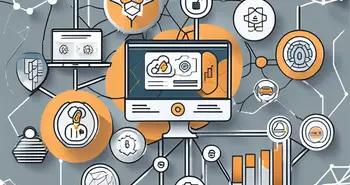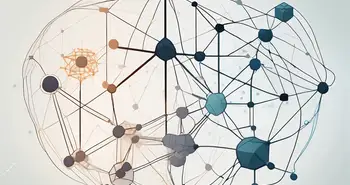DeSoc: How Decentralized Social Media is Changing the Digital Landscape

In recent years, there has been a growing movement towards decentralization in various industries, and social media is no exception. As people become more aware of the issues surrounding traditional social media platforms, they are increasingly turning to decentralized alternatives. This shift is giving rise to a new era of social media known as Decentralized Social Media, or DeSoc for short.
Understanding Decentralized Social Media
To truly grasp the significance of DeSoc, it's important to understand the concept of decentralization itself. Decentralization in social media refers to the distribution of power and control away from a central authority, such as a corporation or government, and towards individual users or communities.
Decentralization is not just a buzzword in the world of social media; it represents a fundamental shift in how online platforms operate. By moving away from centralized control, decentralized social media platforms aim to create a more democratic and user-centric online environment where individuals have a greater say in how their data is managed and shared.
Defining Decentralization in Social Media
Decentralization in social media means that decision-making power is shared among participants rather than being concentrated in the hands of a few. This shift empowers individuals and communities by giving them more control over their own data, privacy, and online experiences.
Furthermore, decentralization fosters a sense of community ownership and collaboration, as users are encouraged to actively participate in the governance and development of the platform. This collaborative approach not only promotes inclusivity but also ensures that the platform evolves in a way that reflects the diverse needs and values of its user base.
The Core Principles of DeSoc
Decentralized social media platforms are built on several core principles that set them apart from their centralized counterparts. These principles include transparency, accountability, and user ownership. In a decentralized social media ecosystem, users have greater visibility into how their data is being used, and they have the power to hold the platform accountable for its actions.
Moreover, user ownership is a key tenet of DeSoc, as it emphasizes the idea that individuals should have sovereignty over their own digital identities and content. This principle stands in stark contrast to traditional social media platforms, where users often relinquish control of their data in exchange for access to the platform's services. By prioritizing user ownership, decentralized social media platforms empower individuals to reclaim agency over their online presence and interactions.
The Evolution of Social Media Platforms
Traditional social media platforms have undoubtedly revolutionized the way we connect and communicate. However, they have also become breeding grounds for issues such as data breaches, privacy concerns, and censorship. This has led to an increasing demand for alternatives that prioritize user empowerment and control.
In addition to these challenges, traditional social media platforms have also faced criticism for their algorithm-driven content curation, which can lead to echo chambers and the spread of misinformation. Users are often served content based on their past behavior, creating a feedback loop that limits exposure to diverse perspectives.
Traditional Social Media vs Decentralized Social Media
While traditional social media platforms rely on centralized servers and a top-down approach to governance, decentralized social media platforms utilize distributed networks and peer-to-peer technology. This decentralization enables greater security, privacy, and control for users.
Decentralized social media platforms also offer users the opportunity to earn cryptocurrency through activities such as content creation and curation. This incentivization model aims to reward users for their contributions to the platform, shifting the power dynamic away from centralized corporations.
The Shift Towards Decentralization
As more users become disillusioned with the centralized nature of traditional social media, there is a noticeable shift towards decentralized alternatives. People are yearning for a more authentic, democratic, and inclusive social media experience that puts them in control of their own data and online interactions.
This shift is not only driven by individual users but also by content creators and influencers who are seeking platforms that offer fair compensation for their work. Decentralized social media presents an opportunity to reshape the digital landscape and create a more equitable environment for all participants.
The Technology Behind DeSoc
At the heart of DeSoc lies innovative technologies that enable decentralized networks and applications. Two key technologies that play a crucial role in DeSoc are blockchain and cryptocurrency.
DeSoc's utilization of blockchain technology goes beyond just creating a decentralized ledger. The implementation of blockchain in social media platforms like DeSoc ensures that user data is securely stored and remains tamper-proof. Each transaction and interaction on the platform is recorded on the blockchain, providing a transparent and immutable record of activities. This not only enhances the security and privacy of user data but also promotes trust among users within the network.
Blockchain and DeSoc
Blockchain technology, often associated with cryptocurrencies like Bitcoin, provides a decentralized and transparent ledger that can be utilized for various purposes, including social media platforms. By leveraging blockchain, decentralized social media platforms can enhance security, privacy, and data integrity, as well as enable greater user control.
Moreover, the decentralized nature of blockchain technology eliminates the need for a central authority to govern user interactions, giving individuals more autonomy over their data and online presence. This shift towards decentralization not only empowers users but also reduces the risk of censorship and data manipulation by centralized entities.
The Role of Cryptocurrency in DeSoc
Cryptocurrencies play an important role in decentralized social media platforms by enabling economic incentives and rewarding users for their contributions. Through the use of cryptocurrency tokens, platforms can incentivize content creation, community participation, and network growth, fostering a vibrant ecosystem.
Furthermore, the integration of cryptocurrency in DeSoc introduces a new dimension of value exchange within the platform. Users can earn cryptocurrency tokens by engaging with content, interacting with other users, and contributing to the community. These tokens can then be used for various purposes within the platform, such as accessing premium features, tipping content creators, or participating in governance decisions. This economic model not only encourages active participation but also creates a self-sustaining ecosystem where users are directly rewarded for their involvement.
The Benefits of Decentralized Social Media
Decentralized social media brings about a multitude of benefits that address the limitations of centralized platforms and cater to the evolving needs of users.
User Privacy and Data Control
One of the most significant advantages of decentralized social media is enhanced user privacy and data control. With decentralized platforms, users have the power to decide what personal information they share, who can access it, and how it can be used. This empowers individuals to maintain greater control over their digital identities.
Freedom of Speech and Censorship Resistance
In traditional social media platforms, content moderation and censorship can often be a contentious issue. Decentralized social media, on the other hand, promotes freedom of speech and minimizes the risks of censorship. By removing the gatekeeping authority from a centralized entity, decentralized platforms create an environment where diverse viewpoints can flourish.
Challenges Facing Decentralized Social Media
While the potential of decentralized social media is immense, it is not without its challenges. These challenges need to be addressed to ensure the widespread adoption and success of DeSoc.
Scalability and Performance Issues
As decentralized social media platforms continue to gain popularity, ensuring scalability and optimal performance becomes crucial. Traditional platforms have the advantage of established infrastructure and resources, whereas decentralized platforms may face hurdles in handling growing user bases and maintaining a seamless user experience.
Regulatory and Legal Concerns
The decentralized nature of social media can present regulatory and legal challenges. Without a centralized authority to oversee and enforce compliance, decentralized platforms must navigate complex legal frameworks to ensure compliance with local laws, address potential misuse, and protect user interests.
FAQ
What is Decentralized Social Media?
Decentralized social media refers to platforms that operate on principles of decentralization, giving users greater control over their data, privacy, and online experiences. These platforms utilize distributed networks and innovative technologies like blockchain to enable transparency, accountability, and user empowerment.
Why is Decentralized Social Media Important?
Decentralized social media is important because it addresses the limitations and concerns associated with traditional, centralized platforms. It empowers users by putting them in control of their data, privacy, and online interactions, and promotes freedom of speech and censorship resistance.
What are the Challenges of Decentralized Social Media?
Decentralized social media faces challenges in terms of scalability and performance as platforms strive to handle growing user bases and provide a seamless user experience. Additionally, regulatory and legal concerns arise due to the absence of centralized authority, requiring platforms to navigate complex legal frameworks.
How Can I Get Started with Decentralized Social Media?
If you're interested in exploring decentralized social media, there are several platforms available. Research and choose a platform that aligns with your values and priorities. Take the time to understand the platform's technology, features, and community guidelines. Remember to approach decentralized social media with an open mind and a willingness to adapt to the new possibilities it offers.
As an expert in the field of decentralized social media, I have personally witnessed the transformative potential of this technology. I believe that decentralized social media has the power to revolutionize the way we connect, share, and interact online. By embracing decentralization, we can take back control of our digital lives and create a more inclusive and empowering social media ecosystem.
My personal advice to anyone considering decentralized social media is to approach it with an open mind and a willingness to embrace change. It may require some adjustment and learning, but the benefits are well worth it. Take the time to explore different platforms and find one that aligns with your values and priorities. Remember that you have the power to shape the future of social media, and decentralized platforms offer a unique opportunity to participate in building a more transparent, democratic, and user-centric digital landscape.
As you embark on your journey with decentralized social media, why not extend the spirit of innovation and control into your investments? Discover Morpher.com, a platform that embodies the principles of DeSoc by leveraging blockchain to offer a revolutionary trading experience. With Morpher, you can trade a variety of asset classes with zero fees, infinite liquidity, and the safety of a non-custodial wallet. Embrace the future of trading with fractional investing, short selling, and up to 10x leverage. Sign Up and Get Your Free Sign Up Bonus today to transform your investing experience just as decentralized social media is transforming our digital interactions.

Disclaimer: All investments involve risk, and the past performance of a security, industry, sector, market, financial product, trading strategy, or individual’s trading does not guarantee future results or returns. Investors are fully responsible for any investment decisions they make. Such decisions should be based solely on an evaluation of their financial circumstances, investment objectives, risk tolerance, and liquidity needs. This post does not constitute investment advice.

Painless trading for everyone
Hundreds of markets all in one place - Apple, Bitcoin, Gold, Watches, NFTs, Sneakers and so much more.

Painless trading for everyone
Hundreds of markets all in one place - Apple, Bitcoin, Gold, Watches, NFTs, Sneakers and so much more.









